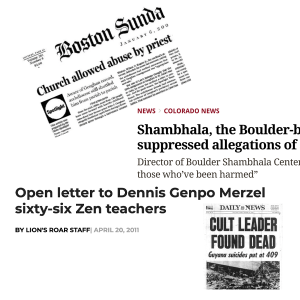It’s been over a year since I first posted about problems in the Boundless Way Zen community. While I had hoped “that we will all get through this together,” that is not what happened.
 It’s been over a year since the last comment on my essay about problems in the Boundless Way Zen Community, Letting in Some Air, was posted. I think it’s time for a public postscript about what has happened since then.
It’s been over a year since the last comment on my essay about problems in the Boundless Way Zen Community, Letting in Some Air, was posted. I think it’s time for a public postscript about what has happened since then.
Unfortunately, while I had hoped “that we will all get through this together,” that is not, in fact, what happened. David Rynick and Melissa Blacker’s insistence on their own unquestionable superior teaching authority, and the facilitation of their power grab by several senior students, led to a deep and painful schism. The other five Boundless Way Zen Guiding Teachers, many members, and a number of sitting groups ultimately left that organization over the fall of 2018 and early 2019. Most of us now affiliate with the Greater Boston Zen Center. David and Melissa continue to lead the Boundless Way Temple (BWT) and Boundless Way Zen (BoWZ). Continue reading “Postscript to “Letting in Some Air””







 It’s been over a year since the last comment on my essay about problems in the Boundless Way Zen Community,
It’s been over a year since the last comment on my essay about problems in the Boundless Way Zen Community, 